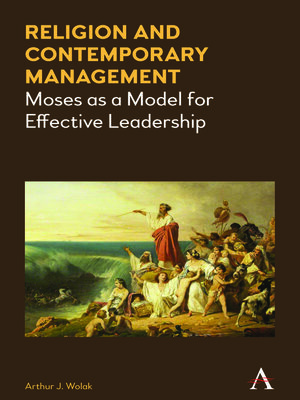Religion and Contemporary Management
ebook ∣ Moses as a Model for Effective Leadership
By Arthur J. Wolak

Sign up to save your library
With an OverDrive account, you can save your favorite libraries for at-a-glance information about availability. Find out more about OverDrive accounts.
Find this title in Libby, the library reading app by OverDrive.



Search for a digital library with this title
Title found at these libraries:
| Library Name | Distance |
|---|---|
| Loading... |
Although few might think of Moses as a 'leader' in the contemporary business and political sense, Moses is not only among the most significant leaders in Western civilization but is also arguably the quintessential example of a powerful leader from whom much can be learned by anyone entering and occupying leadership positions. Various types of leadership approaches are considered that have been advocated by scholars over the past century. Moses' example as described in the Bible is analyzed to assert why Moses' approach makes for an appropriate and compelling form of leadership today.
While present leadership and management vocabulary might differ from the Hebrew Bible, many of the notions advocated by modern leadership theorists appear to parallel major behaviors, traits, functions, experiences and actions ascribed to Moses, especially in the first five books of the Hebrew Bible. Anyone can view Moses through the lens of a particular religion, whether shared or not, and still learn considerably from the experience. One will find Moses depicted as heroic, charismatic, and certainly empathic. Yet, Moses also shows transactional, transformational and visionary leadership qualities. Hence, 'Religion and Contemporary Management' discerns why Moses represents such an important model of effective leadership for contemporary times.
|'Leadership' is crucial to contemporary business, politics, and organizations of every type, including the corporate, non-profit, educational, and government sectors. While modern leadership theorists suggest various models, traits, and approaches to leadership behavior that purport novelty, Ecclesiastes just may have been right that 'There is nothing new under the sun'. The biblical figure of Moses – a familiar name both to adherents of the Western religious traditions and to people who are not – provides an exemplary model of effective leadership that is broadly applicable. Moses is depicted in the Bible as exhibiting 'heroic' and 'charismatic' tendencies. He was certainly empathic. Yet Moses also shows 'transactional', 'transformational' and 'visionary' leadership qualities. A leader of good character, Moses exhibits features similar to the Yiddish term, 'mensch' – someone showing responsibility and integrity, knowing right from wrong.
Though few might think of Moses as a 'leader' or a 'manager' in the contemporary sense, Moses not only holds a firm place among the most significant leaders in Western civilization but is arguably the quintessential example of leadership from whom much can be learned by people entering and occupying leadership positions. While current leadership and management vocabulary might differ from the Hebrew Bible, many of the traits, behaviors and actions advocated by modern leadership theorists appear to emulate those of Moses. Wolak contrasts contemporary leadership ideas with biblical and rabbinic sources that show Moses' leadership qualities, Moses serves as an ancient model with current relevance for what modern leadership theorists argue make for an effective leader.
'Religion and Contemporary Management' discusses and compares original and critical biblical and rabbinic sources with current business leadership and management literature, revealing what leadership theorists' advocate today largely emulates what the Bible depicts as effective leadership through Moses' example. Hence, Moses' influence on current leadership trends in Western culture appears pervasive, even if contemporary leadership theorists do not typically cite Moses as an important source for leadership precedent.







